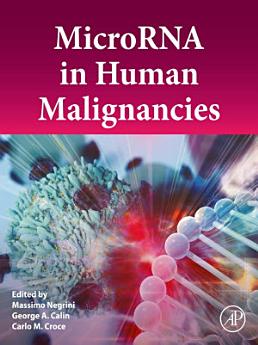MicroRNA in Human Malignancies
About this ebook
About the author
Massimo Negrini is an associate professor in Oncology at the University of Ferrara, where he teaches Molecular Oncology in different graduate and post-graduate programs. He is also director of the Specialization School in Oncology at the University of Ferrara and a biologist executive at the Hospital of Ferrara. He is editor-in-chief of the journal High-Throughput, an international, open access biomedical journal focused on the use of high-throughput technologies (microarray, NGS and other) and serves on the editorial boards of several other international biomedical journals focused on nucleic acids investigation. Prof. Negrini has co-authored more than 248 papers in international peer-reviewed journals.
George A. Calin received both his M.D. and Ph.D. degrees at Carol Davila University of Medicine in Bucharest, Romania. Since 2007, he has run an independent research group at the M. D. Anderson Cancer Center in Houston and produced a new advance by linking new classes of non-coding RNAs to cancer. He is presently a Professor in Experimental Therapeutics at MDACC and studies the roles of microRNAs (miRNAs) and other non-coding RNAs in cancer initiation and progression and in immune disorders, as well as the mechanisms of cancer predisposition linked to ncRNAs. Furthermore, he explores the roles of body fluids miRNAs as potential hormones and biomarkers, as well as new RNA therapeutic options for cancer patients. He has co-authored more than 400 papers and over 20 book chapters
Carlo M. Croce received his B.S. and M.D. degrees from University of Rome. In 1991, Dr. Croce was recruited as director of Kimmel Cancer Institute/Kimmel Cancer Center, Thomas Jefferson University. From 2004-2018, Dr. Croce served as John W. Wolfe Chair in Human Cancer Genetics, Chairman of the Department of Molecular Virology, Immunology and Medical Genetics, and Director of the Institute of Genetics, The Ohio State University (OSU). He is currently professor with the Department of Cancer Biology and Genetics at OSU. He has published more than 1,000 papers in international journals including Science, Nature, Cell, New Engl J Med, JAMA, and Cancer Cell. His research has yielded 62 issued U.S. patents. Dr. Croce is a member of the American Academy of Arts and Sciences, the American Association for the Advancement of Science, The National Academy of Sciences, the Institute of Medicine, and AACR Academy.




